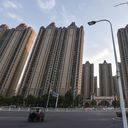China Evergrande has been ordered to liquidate — and the mess is far from over

A Hong Kong court has ordered the failed Chinese property developer, China Evergrande, to liquidate.
Why it matters: The process by which the company is sold for parts — and how the money is returned to creditors — will be closely watched at a time when global investors have quickly been losing confidence in China.
- Evergrande is one of the world's biggest corporate debtors, with roughly $300 billion in liabilities.
State of play: After decades of near-constant global investment in China, capital has flowed out of the People's Republic rapidly over the last year.
- The outflows reflect global investors' diminished outlook for growth there, due to demographic challenges, the impact of increasingly authoritarian rule under Xi Jinping, and the country's persistent inability to shake off the economic impact of COVID.
Flashback: It wasn't that long ago that investors were eager to hand their money over to fast-growing companies such as China Evergrande.
- Even after the company ran into trouble in 2021 due to vast overbuilding, stateside investors seeking distressed-debt opportunities still thought they could make money on it, as yields on its bonds surged — making it a high-risk, but potentially high-reward trade.
Yes, but: There are few precedents for a bankruptcy of this size and complexity in China, and the housing sector is politically sensitive (Chinese homebuyers took the risk of publicly protesting in the tightly controlled nation after the company collapsed).
- That means that the recovery process for investors, which began with the liquidation order, is uncertain.
For example: The liquidation order was issued in Hong Kong, a different jurisdiction than Mainland China, where most of Evergrande's operations and assets are located.
- Though a pilot program on mutual recognition of insolvency proceedings in Hong Kong and China was agreed to in 2021, it applies to courts in only three jurisdictions on the Mainland: Shanghai, Shenzhen and Xiamen, according to Reuters.
- The first step is that those seeking to liquidate the company ask the Hong Kong court to submit a "letter of request" for assistance and cooperation to the three mainland courts.
What they're saying: "The liquidators will have very limited powers of enforcement over onshore assets in mainland China if they cannot get such recognition," Lance Jiang, restructuring partner at law firm Ashurst, told Bloomberg.
The bottom line: If global investors end up feeling ripped off — for instance, if Chinese policymakers intervene to favor domestic creditors rather than foreign investors — it won't make it any easier for China to halt the outflow of capital it needs to reinvigorate growth.